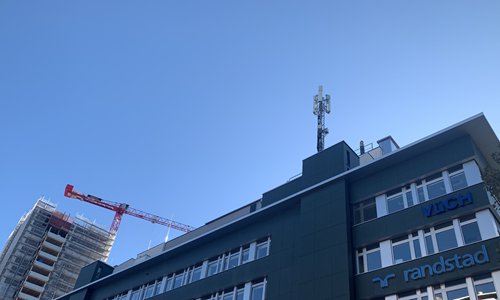
A Huawei 5G base station installed on a rooftop in Zurich in 2019. Photo: Chen Qingqing/GT
Chinese technology giant Huawei Technologies remained top ranked in the global telecom equipment market during coronavirus-plagued 2020 with increased business revenue, despite a US-led discriminative crackdown, an industry report said.
Huawei had a 31-percent market share in terms of global telecom equipment revenue in 2020, followed by Nokia and Ericsson, each having a 15-percent share. Chinese telecom equipment vendor ZTE was No.4 with a 10-percent share, according to the report released on Monday by market research firm Dell'Oro Group.
While both Ericsson and Nokia improved their radio access network positions outside of China, initial estimates suggest Huawei's global telecom equipment market share, including in Chinese mainland, improved by two to three percentage points for the year.
"With investments in China outpacing the overall market, we estimate Huawei and ZTE collectively gained around three to four percentage points of global revenue share between 2019 and 2020, together comprising more than 40 percent of the global telecom equipment market," said the report.
Although Huawei was affected in the 5G segment due to microchips supply cut due to a US government discriminative ban, its advanced 5G technologies still lead other suppliers by one or two years, and it has played an irreplaceable role in China's rapid rollout of 5G base stations to date, telecom industry observers said.
China has 718,000 5G base stations, mostly in medium-sized to large cities, including 330,000 shared among the country's four major telecom operators, data from the Ministry of Industry and Information Technology said. More than 600,000 5G base stations were built and put into operation in China in 2020.
"Unlike microchips supply for mobile phones, Huawei can easily manage the chip supply for its 5G base stations," said Xiang Ligang, an independent telecom analyst, predicting faster growth of 5G shipment this year for Huawei, despite some Western government's unfair geopolitical restrictions.
A senior executive of Huawei claimed earlier that the company has built more than 140 commercial 5G networks that are deployed in 59 countries and regions so far.
The COVID-19 pandemic-related supply chain disruptions that affected some telecom networks in the early part of 2020 were mostly alleviated toward the end of the year, the Dell'Oro report said.
Analysts at Dell'Oro remain optimistic about 2021 and project the overall telecom equipment market to advance 3-5 percent on a yearly basis.




